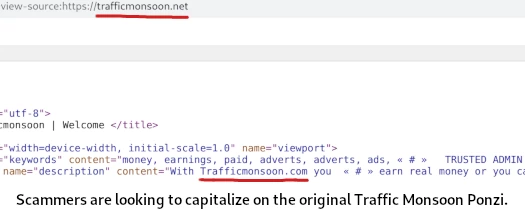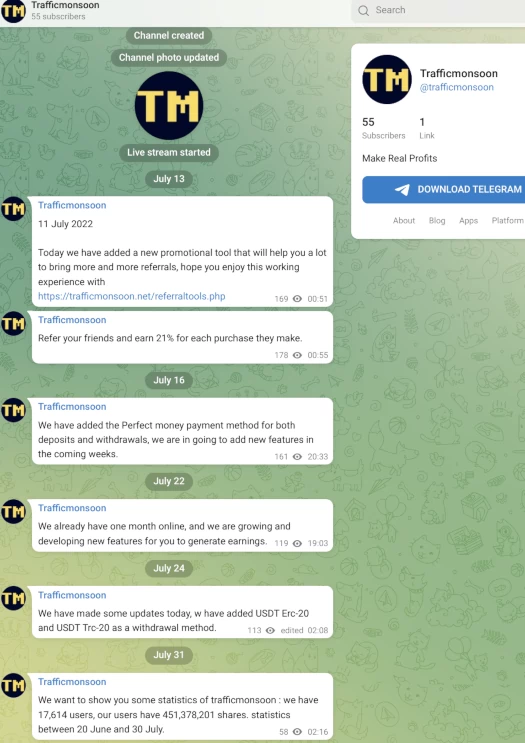Scammers resurrect Traffic Monsoon Ponzi, add crypto
![]() The notorious Traffic Monsoon Ponzi scheme has been resurrected.
The notorious Traffic Monsoon Ponzi scheme has been resurrected.
This time opportunistic scammers are hoping to fleece new victims through cryptocurrency.
Whereas the original Traffic Monsoon operated from a .COM domain, the 2022 iteration operates from “trafficmonsoon.net”.
The .NET domain was privately registered on June 6th, 2022.
The new Traffic Monsoon website is a freemium template from HTML Codex:

The Ponzi model is simple; investors invest $1 in adpacks, one adpack equates to 1300 shares, daily returns are paid based on how many shares an affiliate has invested in:
- invest in 1300 to 3000 shares and receive 10 cents a day
- invest in 3001 to 12,000 shares and receive 25 cents a day
- invest in 12,001 to 93,150 shares and receive $1 a day
- invest in 93,151 to 517,500 shares and receive $4.50 a day
- invest in $517,501 to 2,794,500 shares and receive $25 a day
- invest in 2,794,501 to 17,365,000 shares and receive $135 a day
- invest in 17,365,001 to 38,000,000 shares and receive $755 a day
Investors are required to click ads daily to qualify for returns. A 21% commission is paid on funds invested by personally recruited affiliates.
Like the original Traffic Monsoon, the reboot isn’t MLM.
Unlike the original Traffic Monsoon, the reboot solicits investment in USD and various cryptocurrencies.
The SEC shut down the original Traffic Monsoon, a $207 million dollar Ponzi scheme, in 2016.
 Traffic Monsoon founder Charles Scoville (right), is in prison on attempted child sexual abuse charges. He has also been indicted for wire and tax fraud.
Traffic Monsoon founder Charles Scoville (right), is in prison on attempted child sexual abuse charges. He has also been indicted for wire and tax fraud.
Scoville’s life is pretty much over so it’s unlikely he’s behind the new Traffic Monsoon.
A random residential address in the Netherlands is provided on Traffic Monsoon’s website. This i presumed to be meaningless.
Given the low-effort nature of Traffic Monsoon’s reboot, it’s probably just some opportunistic random looking to make a quick buck.

Whoever’s running Traffic Monsoon, they’re coordinating the Ponzi scheme through a shady Telegram group:

Telegram has earned a reputation for being synonymous with online fraud.
I don’t see this going anywhere but we’ll keep you posted on any significant developments.


SEC is an organization linked to the stock market, and therefore, it does not have the skills to pursue the sale of online advertising.
All the charges against Charles Scoville are false. (Ozedit: derails removed)
The SEC regulates securities. Ponzi schemes are unregistered securities.
Scoville pled guilty to attempted child sexual abuse. The SEC secured judgment against Traffic Monsoon and Scoville.
Scoville’s life is already over but there’s still the criminal tax charges to resolve.
If you’re hellbent on dying on the Traffic Monsoon Ponzi hill, that’s cool. But facts are facts.